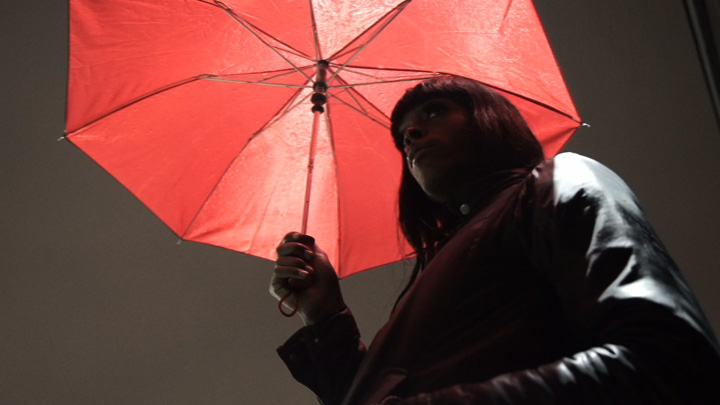“Don’t get out of the car, unless you have to,” Joe, my security guard, told me, gun at his hip.

We were filming on Woodward Avenue in Detroit, MI. It is an area known for prostitution, shootings and the murders of several transgender women.
Cheap motels and abandoned buildings line the street and the cold drizzle leaves Palmer Park across the street looking haunted. Transgender women walk up and down Woodward Avenue, shivering in the wind. Cars slow down. Women walk up to them.
READ MORE: The fight for trans rights: Character profiles
“Not too long ago, a woman and a child opened a dumpster and found a trans woman in there,” Julisa Abad, a transgender woman, told me as we stood on the corner. She says many women like her can’t find other jobs, proper housing or enough support.
Abad is one of the lucky ones, she has a job making minimum wage. In her spare time, she is an advocate, hoping to protect women who work in this area. She will take down license plates and offer condoms and support to women she calls her “trans sisters”.
“Some of them have been found killed, dead, in different parts of the city. One was hit by a car. It’s just not safe.”
That’s why Abad always carries at least one knife.
WATCH BELOW: Transgender woman Julisa Abad talks about what people don’t realize about being transgender
Johns, or men looking for “dates,” circle our van. “Sometimes, there are dozens of girls out here,” Joe the security guard told me.
The statistics are sobering.
Last year, according to the Trans Murder Monitoring Project, a transgender person was murdered every 31 hours, worldwide. According to a study out of the US, transgender people are four times more likely to live in poverty.
And in one of the only surveys of transgender people in Canada, TransPulse found 20 per cent have been sexually or physically assaulted and 10 per cent have been denied emergency hospital care in Ontario. Perhaps most disturbing, over 40 per cent of transgender people will attempt suicide.
READ MORE: One Montreal family’s fight for transgender rights
In the United States, 22 transgender women have been murdered this year.
Back in Detroit, I get introduced to 26-year-old transgender woman Ashley Avery. She’s homeless and says if she got any other job she would have to work as a boy. “And I can’t live life as a boy,” she says. “I’m a girl.”
She says while working the street, bottles will be thrown at her, she could get robbed or beat up. But she says she has nowhere else to go.
READ MORE: Looking for help? Here are some resources for LGBTQ people
Over the course of the night, I watched Avery get in multiple cars, sometimes with multiple men inside. Abad would sometimes get the license plate. Sometimes she wouldn’t. Each time I was worried about what could happen to Avery.
The violence has been happening in Canada for decades:
- Cassandra Do – murdered in 2003 in Toronto. Remains unsolved
- Divas Belanger – murdered in 2004 in Winnipeg. Theodore Herntier convicted of murder in 2015
- January Marie Lapuz – murdered in 2012 in New Westminster, BC. Charles Jameson Mungo convicted of manslaughter in 2014
- Sumaya Dalmar – found dead in 2015 in Toronto
Gender identity is not explicitly covered under Canada’s Criminal Code or the Canadian Human Rights Act.
Bill C-279 – introduced in 2011 – was an attempt to address the issue.
The legislation was drafted to give transgender people further protection from hate crimes, discrimination and access to service providers, washrooms and prisons in the gender they identify as.
But it never became law. It was held up in the Senate and died on the order table when the federal election was called in August.
Prime Minister Trudeau campaigned on a platform to protect trans rights, but it’s not clear if the Liberal government will introduce legislation of its own to address the issue.
While the gay rights movement has made great strides toward equality, many transgender people say they feel like they cannot live in the gender they identify, their rights left to the side. That leads to discrimination. And that means they don’t feel safe accessing health care, going to school or applying for jobs.
“When people can’t figure you out they … get angry. They’re afraid, they get aggressive,” Alex Abramovich, a post-doctoral fellow at the Centre for Addiction and Mental Health (CAMH) in Toronto, says.
Abramovich says that anger and aggression leads to what he calls transphobia – not treating transgender people with basic human respect. It also leads to isolation, marginalization and victimization.
Imagine being called the wrong name constantly, referred to with the wrong pronoun or insulted on a daily basis, Abramovich says.
“If we’re not protected … then once again we’re erased and we’re not recognized,” says Abramovich. “Transphobia leads to suicide, end of story.”
While filming this piece in Canada and the U.S., almost every trans person I spoke to knew someone who was killed, committed suicide or assaulted within the last week. That is not supposed to be “part” of being transgender.
Detroit may be on the extreme end of the violence spectrum. But it is a place to learn what can happen when transgender people aren’t protected. Without proper resources, support or simple compassion, transgender people can be made vulnerable to violence.
Still, many trans people call being trans a gift.
“I’m so at peace with myself and so comfortable in my own skin,” says Julisa Abad, adding that it takes a lot of courage to be herself.
With all this in mind, as I sat on Woodward Avenue in Detroit, watching transgender women get “dates,” I realized that courage was something to be admired, not cast aside. After all, everyone has a right to be themselves.
16×9’s “The Fight for Trans Rights” airs Saturday, Dec. 5, 2015.
With files from Megan Rowney




Comments